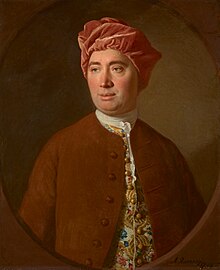
Secular humanists
Secular humanism is a philosophy, belief system or life stance that embraces human reason, secular ethics, and philosophical naturalism while specifically rejecting religious dogma, supernaturalism, and superstition as the basis of morality and decision making.Secular humanism posits that human beings are capable of being ethical and moral without religion or belief in a deity. It does not, however, assume that humans are either inherently good or evil, nor does it present humans as being superior to nature.
2 episodes
Episodes in this category also belong to the following categories:
Bertrand Russell
Melvyn Bragg and his guests discuss the influential 20th-century British thinker Bertrand Russell, widely regarded as one of the founders of Analytical philosophy.
6 December 2012
Featuring: A. C. Grayling, Mike Beaney, Hilary Greaves
PhilosophyNobel laureates in LiteratureBritish philosophers of languageGeorgistsEnglish political writersFree love advocatesSet theoristsAristotelian philosophersWriters about religion and scienceJerusalem Prize recipientsFellows of Trinity College, CambridgeEnglish logiciansPhilosophers of mathematicsBritish historians of philosophyEmpiricistsOntologistsMetaphysics writersBritish political philosophersFellows of the Royal SocietyMetaphilosophersTheorists on Western civilizationBritish ethicistsPhilosophers of literatureBritish free speech activists20th-century English philosophersAnalytic philosophersEnglish humanistsRhetoric theoristsAtheist philosophersEnglish political philosophersEnglish anti-fascistsEnglish people of Scottish descentPhilosophers of historyEnglish agnostics20th-century atheistsConsequentialistsEnglish socialistsPhilosophers of social scienceBritish philosophers of religionPresidents of the Aristotelian SocietyLogiciansPhilosophers of lawPhilosophers of sexuality19th-century English mathematiciansCritics of work and the work ethicSecular humanistsPhilosophers of technologyPhilosophers of economicsWriters about globalizationBritish philosophers of educationBritish philosophers of culture, English pacifistsBritish philosophers of logicCritics of the Catholic ChurchPeople from MonmouthshireAlumni of Trinity College, CambridgeLinguistic turnPhilosophers of loveEuropean democratic socialistsBritish consciousness researchers and theoristsWriters about activism and social changeEnglish Nobel laureatesMembers of the Order of MeritEnglish prisoners and detaineesUtilitariansIntellectual historians, University of Chicago facultyEnglish scepticsBritish critics of ChristianityEnglish people of Welsh descentUniversal basic income writersBritish philosophers of mind19th-century English philosophersBritish critics of religionsAcademics of the London School of Economics, British philosophers of science19th-century atheistsUniversity of California, Los Angeles facultyAnti-nationalists20th-century English mathematiciansEnglish essayistsFreethought writersBritish atheism activistsWriters about communism19th-century English essayistsEnglish male non-fiction writersDavid Hume
Melvyn Bragg and his guests discuss the work of David Hume, the philosopher and leading figure of the Scottish Enlightenment.
6 October 2011
Featuring: Peter Millican, Helen Beebee, James Harris
PhilosophyCriticism of rationalismEpistemologistsAction theorists18th-century British essayistsMetaphilosophersSkeptic philosophersPhilosophers of social scienceTheorists on Western civilizationPhilosophers of logicSecular humanistsSocial philosophersPhilosophy writersPhilosophers of economicsWriters about religion and sciencePhilosophers of identityBritish philosophers of educationVirtue ethicistsBritish male non-fiction writers18th-century British philosophersPhilosophers of psychologyPhilosophers of artCritics of the Catholic ChurchBritish critics of religionsPhilosophers of mathematicsAlumni of the University of EdinburghConservatismEmpiricistsOntologistsPhilosophers of mindDeist philosophersPeople of the Scottish EnlightenmentPhilosophers of religionFreethought writersBritish consciousness researchers and theoristsEnlightenment philosophersWriters about activism and social changePhilosophers of sciencePhilosophers of historyBritish male essayists

